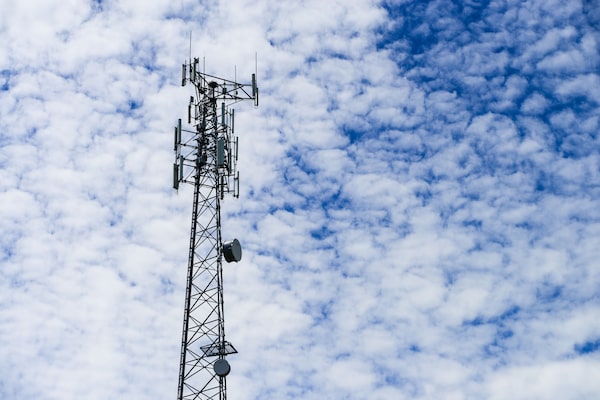
Security experts around the world agree that Huawei 5G could be enabled to facilitate Chinese state espionage or the disabling of Canadian critical infrastructure in time of conflict.Sean Kilpatrick/The Canadian Press
Charles Burton is a senior fellow at the Macdonald-Laurier Institute and non-resident senior fellow of the European Values Center for Security Policy in Prague. He is a former professor of political science at Brock University and has served as a diplomat at Canada’s embassy in Beijing.
Last week, a beaming Foreign Minister Marc Garneau indicated the government, fresh off the return of Michael Kovrig and Michael Spavor, would follow a four-fold approach to China: coexist, compete, co-operate and challenge. This would have pleased the Chinese Embassy in Ottawa very much. Indeed, it suggests Canada is about to fall into the Chinese Communist Party (CCP) United Front Work Department narrative of qiutong cunyi, meaning “set aside differences and seek common ground.”
In actuality, Ottawa is pursuing a five-fold approach, the fifth being capitulation. What we are in effect promising is that Canada would give the CCP a pass on the Uyghur genocide, repression of freedoms in Hong Kong, extensive espionage, interference and harassment in Canada, the debt-trap diplomacy of the Belt and Road Initiative and expansion of China’s strategic claims in the South China Sea, among other activities. This would be done ostensibly to secure free trade, climate co-operation and other priorities for which China will never be a good-faith partner.
It remains to be seen whether this policy of weakness will persist to the detriment of Canada’s sovereignty and security when it comes to Huawei’s participation in Canada’s 5G infrastructure.
Prime Minister Justin Trudeau says he will share his decision on this question in the “coming weeks.” It is troubling that after delaying this decision for years, and after our allies in the Five Eyes consortium have all effectively banned Huawei from their 5G networks, Ottawa still wants to move slowly.
Will we be firmer with China, now that the two Michaels are free? Don’t bet on it
Does Beijing now prefer to be feared rather than loved?
Security experts around the world agree that Huawei 5G could be enabled to facilitate Chinese state espionage or the disabling of Canadian critical infrastructure in time of conflict. Allowing Huawei into our 5G, even on the periphery of the network, is nothing short of appeasement at the expense of security. And so long as Canada continues to collaborate with China, it does so in an asymmetrical power relationship where the CCP always has the upper hand.
Approving Huawei 5G in any capacity would indicate that the government has chosen to forge an independent foreign policy that manoeuvres a middle path between the U.S. and China. Let’s be clear: None of our allies will buy this sort of sophistry. If we go this route, China will have succeeded in its overall agenda to put a wedge into the solidarity of the Western alliance.
Already Canada has been excluded from the new AUKUS pact formed by the U.S., Britain and Australia, and we are not on the agenda for inclusion in the Quadrilateral Security Dialogue (or Quad), made up of the U.S., India, Japan and Australia. President Joe Biden’s nominee for the next U.S. ambassador to Canada made it clear that our allies are waiting for us to develop a clear and coherent strategy for dealing with the CCP.
Canadian virtue signalling on the Chinese regime’s malign policies at home and abroad no longer cuts it with our allies. Similarly, we can’t have Parliament condemn the Uyghur genocide while the Prime Minister and his entire cabinet abstain in order to send a reassuring signal to the Chinese Embassy. The same goes for promising meaningful measures on Hong Kong that are never acted upon.
Simply put, we can’t have it both ways when it comes to China, especially now that Mr. Kovrig and Mr. Spavor are finally back in Canada. We can no longer take a free ride on the U.S. defending the integrity of the rules-based international order in trade and diplomacy while we try to make enriching deals with the Chinese Communists.
Many in Canada’s business and political elite seem to think that talking out of both sides of our mouth when it comes to China somehow represents a sophisticated and mature policy option. Nothing can be further from the truth. Our allies can see through such facile deceptions and, as the stakes around the West’s strategic competition with China increases, their patience with such manoeuvring only wears thin.
Instead, Canada should follow its own public opinion by adopting a principled and honest approach to engaging with China – one that sees the CCP for the adversary that they truly are – even as it attempts to pursue some form of engagement on those areas in which co-operation seems warranted.
As a first step, it’s time for our newly re-elected government to do the right thing and ban Huawei from our 5G network. Only then will Canada finally begin to restore our self-respect and be able to buttress the rules-based international order.
Keep your Opinions sharp and informed. Get the Opinion newsletter. Sign up today.